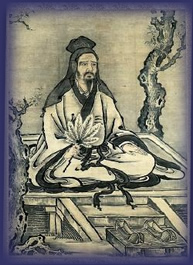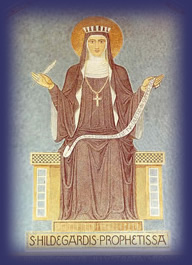
Japanese
silk painting of Confucius
Museum of Fine Arts, Boston
[He]
is the sort of man who forgets to eat when he tries
to solve a problem that has been driving him to distraction,
who is so full
of joy that he forgets his worries and
who does not notice the onset of old age...
Confucius, speaking of himself

Hildegard von Bingen
Abbey Church of St Hildegard, Germany
[She
is a] small sound of the trumpet from the living light.
Hildegard, speaking of herself
There are over sixteen hundred years between these two figures, Confucius and Hildegard, yet it is nonetheless interesting to compare them. They both suffered what might be considered major setbacks at a vulnerable age—Confucius lost his father and Hildegard was separated from her family—yet they nonetheless went on to live intensely creative lives. However much we might wish it otherwise, it is accident of birth and not absolute truth that shapes our earliest beliefs, and what constitutes ‘religion’ is very much a matter of definition. Yet it is undeniable that they both felt the call of something greater than themselves, a sense of sacred duty to give their deepest convictions voice in a manner that would—in their own time and place—open hearts and strike a chord.
In the Analects (II.4) Confucius is quoted as saying: “...at fifty I understood the mandate of heaven...” By this, he most likely meant as it applied to him. And from everything else he has said, it seems likely that he experienced this influence not as a grant to power but rather as the impulse to do right; what was perhaps his own unique slant was to insist that righteous action had to be tempered by a spirit of benevolence.
It is curious to wonder what would have happened to Hildegard if she hadn’t been that tenth child. Would she have voluntarily joined a religious order? Or, given in marriage, would she have found some other way to express her various gifts? Being pledged to the church at an early age had ensured her an education. However it was her own visionary creativity that enabled her to go beyond the limitations usually imposed on the women of her time to become an influential and powerful leader.
Fertile minds always seek to seed and we are still today reaping their sowings. Hildegard has been labeled a saint, Confucius a great sage. Yet perhaps it is most useful for us to see them as two individuals that chose to live creatively, to seize their opportunities and strive to make the best of the circumstances into which they were born.
Nora Leonard, September 2004